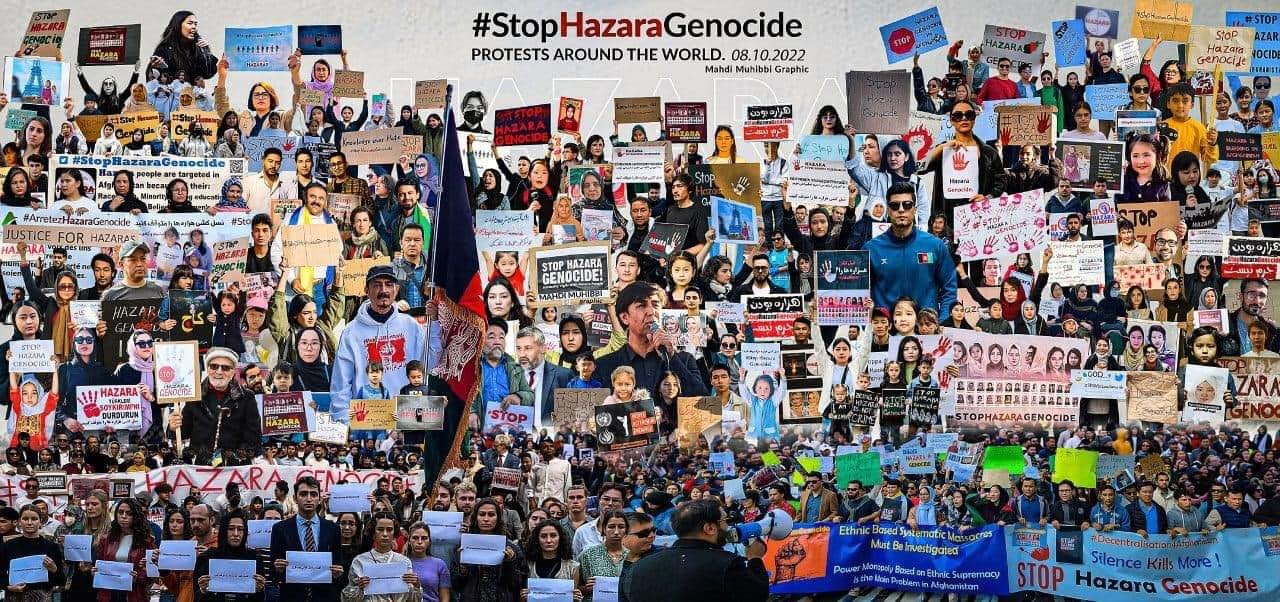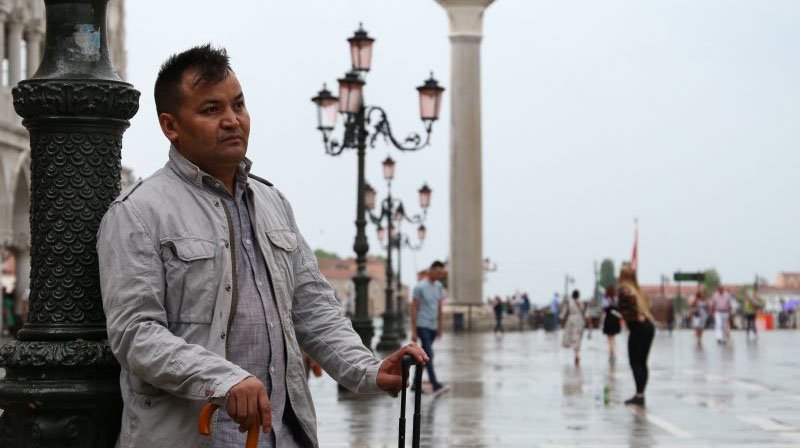Salute to Pines: Commemoration Gathering to Celebrate the fortieth day of the victims of Kaaj (Pine) Educational Center and also Appreciation of the Italian Writer and Hazaralogist Researcher in Milan.
Hazara World: Milan-Italy
Translated by: Mr. Akram Gizabi
On November 16, 2022, a commemoration event celebrating the fortieth day of the Kaaj educational institute victims was held in Milan. At the same time, Claudio Concas a young Italian writer and specialist on Hazara people was awarded two certificates of appreciation by World Hazara Council and Hazara World Media for writing a book and doing research about the Hazaras.
The event started with paying respect to the victims of Kaaj center on the fortieth day of the terrorist attack. Amin Wahidi, one of the Hazara activists in Milan spoke in Italian about the program:
“Our event today which is held under the title of “Salute to Kaajes or Pines” is about the students who lost their lives for pursuing education and learning. They are no longer among us but their memories will stay with us forever among our people like pine trees that always remain green.
“The event is also held to appreciate the efforts of a young Italian researcher, Claudia Concas who has been doing research for some years about the Hazaras.
“We have gathered in a place that is symbolic for two reasons: One is that this place is adjacent to the public university of Milan that is involved in science and knowledge. The other reason is that it is close to the Piazza Fontana which is a place where in 1969 in a terrorist bombing 88 people perished. After 50 years, the people still remember the event as one of the worst tragedies of Italy and every year people commemorate the occasion, while the Hazaras are facing these kinds of tragedies almost on a daily basis. We hope that one day the Hazaras will find security and peace.
“Today, we have wonderful people who have honored us by joining this event. From right, we have Mr. Hussain Rezai, a researcher and the founder of Najiba Foundation, Mr. Akram Gizabi, currently World Hazara Council Ambassador and former president of the council, Mr. Claudio Concas the Italian writer and researcher. The program will be moderated by Miss Rahel Saya.
I give the floor to the chair and the guests who will speak in Italian, English and Persian. At the end of the program there will time for Q & A. Thank you for coming.”
Miss Rahel Saya explained the agenda of the program and the first speaker was Mr. Gizabi who spoke in English and Dari and thanked the people for the organizers and participants in the event.
He spoke about the importance of the Hazara Genocide issue reaching the attention of the important countries such as Italy that have rich and long histories. He said:
“I hope that after the publication of this book, other Italian and European researchers will follow suit and write about the Hazaras and their massacres. The Hazaras are facing a very complicated situation today, their massacres have been going on for decades and only occasionally were exposed while often were hidden. They have been discriminated against and forcibly marginalized. The Taliban after gaining power in the 1990s massacred a lot of the Hazaras in Mazar-e-Sharif, Yakawlang and Bamiyan. During the last two decades, even with the presence of the international forces, hardly a day would pass without 8 to 10 people were not killed. During the last few years, an active genocide has been waged against our people. We are hoping that the people of Italy and other European countries, those that value human lives will become our voices and join us. The freedom loving Hazaras who follow world values need the help and support of the civil societies and compassionate and freedom loving people to succeed in their struggle for freedom, equality and women rights.”
Mr. Gizabi talked briefly about the activities of the World Hazara Council and also about the role of the continued civil and peaceful struggle of the people. He said since the Hazaras do not have arms to fight the terrorist Taliban in the country, they do have a more important weapon to fight in the social media of the world to make their voices heard by the freedom loving people of the world to join them. Mr. Gizabi emphasized the continuation of the peaceful struggle by providing information, creation of contacts with parliaments of the countries involved in Afghanistan. He mentioned the reaction of the parliaments in Britain, Canada, Italy, and Australia to the genocide of Hazaras and the continuation of these protests very useful. He also mentioned the Bolaq Analyst Network that has issued valuable analyses on the current issues in Afghanistan both in English and Dari.
After Mr. Gizabi, Mr. Hussain Rezai the founder of Najiba Foundation spoke.
“The story of Hussain Rezai and Najiba Foundation is one of a prominent Hazara reaction to the tragedies. The Hazaras after each bloody tragedy and despite great loss and sorrow have not resorted to violence and revenge but have reacted very humanely and lasting reaction to the tragedy. We have other examples as well but Najiba Foundation is one of them. Najiba Hussaini Bahar was engaged to Mr. Rezai. Two weeks prior to their wedding in 2017, Najiba was killed in a terror attack on the bus carrying the personnel of ministry of mine and petroleum. Two years after the incident, Mr. Rezai and some other activists started Najiba Foundation. The foundation, named after Najiba, included a large library in Nilli Daikundi, her birth place. The center also included a computer training section and a girls volleyball team. The foundation worked successfully for two years until the Taliban takeover. The foundation was closed by the terrorist Taliban and the resources and equipment were looted and destroyed.”
After the brief introduction of Mr. Rezai and the foundation by Amin Wahidi, Mr. Rezai gave a very valuable information about the ethnic constitution of Afghanistan and then he started his presentation in English of an academic research about the statistics and number of massacres of Hazaras in the last few years.
Mr. Rezai presented a detailed statistics of the targeted massacres of the Hazaras both in their first takeover of the country in the 1990s and a few years after that. The presentation included the time, place, number of victims in charts. The research included the targeted killings of the Hazaras in educational institutions, religious places, hospitals, and even in public transportation system and also the concerns of Hazaras about the widespread human rights violations especially after coming to power of Taliban in the last one and a half years. Mr. Rezai says the report was shared with the international human rights organizations as well. The report documents the increasing casualties of the Hazaras in the last few years that despite thousands of victims, so far not a single perpetrator is recognized, arrested or prosecuted.
The report mentions not only the massacre and the physical elimination of the Hazaras but also documents other forms of violence against Hazaras such as the forced displacement of people from their lands, confiscation of agricultural lands, geographical boycott, and destruction of the historical artifacts. The perpetrators of these crimes have not been brought to the court of justice. Mr. Rezai concluded his presentation with a plea from the world community and human rights organizations for protection of the Hazaras against these systemic and continued violence.
Next speaker was Mr. Claudio Concas who spoke in English.
Appeal for the support of international research projects for the Hazaras
Mr. Concas became fond of the Hazaras after meeting on individual living in Italy who was of Hazara origin. He started his sociological and anthropological research of the Hazaras two years ago. He has written a book recently under the title of “Voices of Hazaristan” in Italian that explores the situation of the Hazaras from the creation of Afghanistan in 1747 to date. He has interviewed contemporary Hazara activists and intellectuals for his book and these days he is busy launching his book in different Italian cities.
Claudio Concas has studied historical documents, books and academic papers about Hazaras and has become one of the few Western researchers who knows Hazaras not only from books and documents but also through direct contacts with Hazara personalities and activists. He studies the Hazaras from up close. He is currently working on his Ph.D. in University of Milano-Bicocca. His doctoral thesis will be on Hazara Genocide.
Claudio Concas also spoke about his other projects concerning the Hazara people. One of the important projects is writing a biography of “Ustad Abdul Ali Mazari” in Italian. He says in Western countries there are lots of books written about some of the Afghan political personalities, but regrettably the Hazaras despite having a lot of writers and academics have not written a biography of Abdul Ali Mazari in international languages. He says he wants to write this book and hopes that the Hazaras would support him.
He was asked how he got interested in the biography of Abdul Ali Mazari? He said: “Firstly, Mazari was a leader that more than 30 years ago when he established Hizbe Wahdat (Unity Party), there were women in the central committee of the party. Mazari despite being a religious figure had enough women in the party and as an intellectual leader believed in the equality of genders. How can one forget this issue especially that the situation of women is in serious danger in Afghanistan today. Secondly, there is limited information about Mazari in the internet or social media and even that is tainted with bias and discrimination. I want to write the real biography of Mazari.”
Another project of Mr. Concas is a graphic novel of the biggest civil movement in Afghanistan, namely the “Enlightenment Movement.” He wants to keep alive the memory of victims of the movement who lost their lives in a terrorist bombing. In this project also he needs the help and support of generous Hazaras.
The other project that he mentioned is another graphic novel about the survivors of the massacres during Abdur Rahman. He wants to create this book using the graphic and artistic help of professional artists to write a story of the massacres of 1891-1893.
At the moment, he is collecting evidence about the food discrimination against Hazaras so that he will present a research paper to the international organizations involved in Afghanistan. The research paper will use the information from inside the country, collecting documents and witnesses in the field of the intentional and systemic negligence and discrimination by the WFP against Hazaras in the provinces inhabited by them. One of the recent examples was distribution of spoiled flour in Bamiyan and Daikundi provinces.
After Claudio Concas, there was a Q and A session.
At the closing of the event, two certificates one from the World Hazara Council by Akram Gizabi and another one by Bashir Barati, founder of the Hazara World media were presented to Claudio Concas.
Mr. Akram Gizabi at the end of the event encouraged the Hazaras to support Claudio Concas in his projects and also asked those people in their countries of residence to encourage researchers and writers to take projects on Hazaras and support them.



